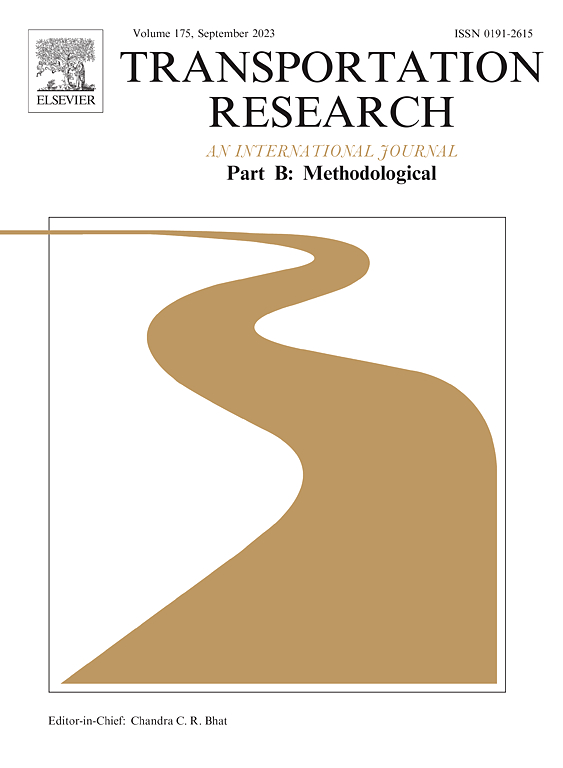Optimal matching for ridesharing systems with endogenous and flexible user participation
IF 6.3
1区 工程技术
Q1 ECONOMICS
引用次数: 0
Abstract
The performance of ridesharing systems is intricately entwined with user participation. To characterize such interplay, we adopt a repeated multi-player, non-cooperative game approach to model a ridesharing platform and its users’ decision-making. Users reveal to the platform their participation preferences over being only riders, only drivers, flexible users, and opt-out based on the expected utilities of each mode. The platform optimally matches users with different itineraries and participation preferences to maximize social welfare. We analytically establish the existence and uniqueness of equilibria and design an iterative algorithm for the solution, for which convergence is guaranteed under mild conditions. A case study is conducted with real travel demand data in Chicago. The results highlight the effect of users’ flexibility regarding mode preferences on system performance (i.e., the average utility of users and the percentage of successful matches). A sensitivity analysis on the level of subsidy and the distribution of utility between matched riders and drivers shows that uneven distributions of utility may lead to a higher percentage of successful matches. Additional insights are provided on the effect of a user’s origin and destination locations on their role choice and likelihood to be matched.
具有内生灵活用户参与的拼车系统的最优匹配
拼车系统的性能与用户参与紧密相连。为了描述这种相互作用,我们采用了一种重复的多人非合作博弈方法来模拟拼车平台及其用户的决策。用户向平台透露了他们的参与偏好,包括只做乘客、只做司机、灵活的用户,以及根据每种模式的预期效用选择退出。平台优化匹配不同行程和参与偏好的用户,实现社会福利最大化。我们解析地建立了平衡点的存在唯一性,并设计了一种迭代算法,该算法在温和条件下保证了收敛性。以芝加哥的真实旅行需求数据为例进行了案例研究。结果突出了用户在模式偏好方面的灵活性对系统性能的影响(即,用户的平均效用和成功匹配的百分比)。对补贴水平和匹配骑手和司机之间效用分配的敏感性分析表明,效用分配的不均匀可能导致更高的匹配成功率。还提供了关于用户的原始位置和目的地位置对其角色选择和匹配可能性的影响的其他见解。
本文章由计算机程序翻译,如有差异,请以英文原文为准。
求助全文
约1分钟内获得全文
求助全文
来源期刊
CiteScore
12.40
自引率
8.80%
发文量
143
审稿时长
14.1 weeks
期刊介绍:
Transportation Research: Part B publishes papers on all methodological aspects of the subject, particularly those that require mathematical analysis. The general theme of the journal is the development and solution of problems that are adequately motivated to deal with important aspects of the design and/or analysis of transportation systems. Areas covered include: traffic flow; design and analysis of transportation networks; control and scheduling; optimization; queuing theory; logistics; supply chains; development and application of statistical, econometric and mathematical models to address transportation problems; cost models; pricing and/or investment; traveler or shipper behavior; cost-benefit methodologies.

 求助内容:
求助内容: 应助结果提醒方式:
应助结果提醒方式:


